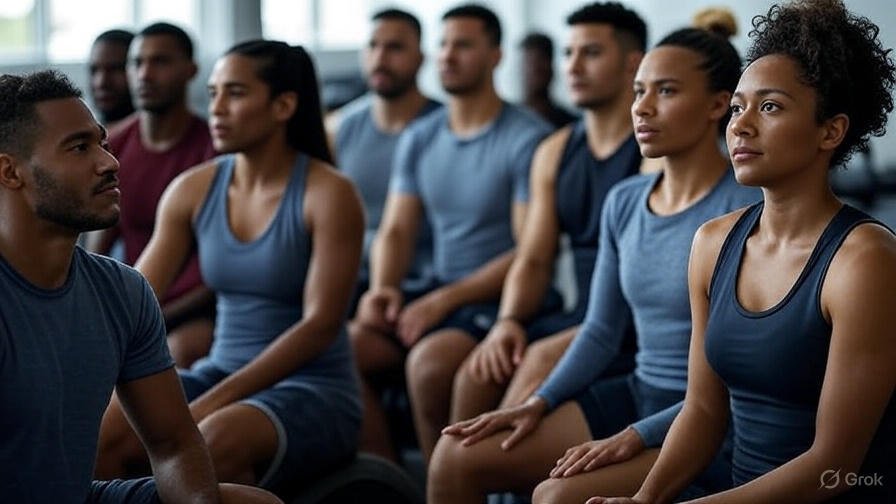In the high-stakes world of competitive athletics, where physical prowess often takes center stage, a quieter revolution is underway. Mental training, once considered a niche aspect of preparation, is now recognized as a critical component for success. As athletes gear up for major events like the 2028 Olympics, professionals in the field are highlighting innovative approaches to building resilience and focus. This shift comes amid growing awareness of mental health challenges in sports, prompting teams and individuals to seek specialized support.
Recent studies underscore the importance of psychological factors in performance. For instance, research published earlier this year explored how environments conducive to physical activity can enhance overall wellbeing, suggesting that structured mental strategies can lead to thriving rather than just surviving in demanding scenarios. Experts argue that understanding these dynamics is essential for coaches and athletes alike.
A Historical Perspective on Mental Training in Athletics
The roots of this discipline trace back to the early 20th century, when researchers began examining the mind’s role in physical endeavors. Pioneers like Coleman Griffith, often called the father of the field in America, worked with teams to apply psychological principles to training regimens. Over decades, it has evolved from basic motivation techniques to sophisticated methods involving neuroscience and biofeedback.
By the 1980s, Olympic committees started integrating mental coaches into their programs. Today, it’s commonplace for top-tier athletes to work with specialists who help manage stress, visualize success, and recover from setbacks. This progression reflects broader societal changes, including increased openness about mental health issues.
In Europe, particularly in countries with strong athletic traditions, similar advancements have occurred. Lithuania, for example, has produced notable figures in this area, contributing to global discussions on athlete development. Resources like those found in sporto psichologija highlight practical applications tailored to diverse needs, from individual consultations to team dynamics.
Current Trends and Innovations
As we move through 2025, several key trends are shaping the field. One prominent development is the integration of technology, such as virtual reality simulations that allow athletes to practice high-pressure situations in a controlled environment. A journal article from this year discusses how these tools can enhance decision-making under stress, potentially revolutionizing preparation for events like world championships.
Another focus is on mental health recovery post-injury or competition. With the rise in reported cases of burnout among professionals, interventions targeting emotional competence and resilience are gaining traction. A recent global study reviewed in psychiatric literature examined the impact of concussions on psychological states, emphasizing the need for comprehensive support systems. This includes addressing anxiety, which can manifest as performance blocks even in seasoned competitors.
Artificial intelligence is also making inroads. Tools that analyze behavioral patterns to predict and prevent mental fatigue are being tested in various leagues. A narrative review published this year outlines how AI could assist in talent identification and personalized training plans, blending data analytics with traditional counseling methods. While promising, experts caution that technology should complement, not replace, human interaction.
In the realm of team sports, fostering group cohesion has become a priority. Techniques for improving communication and resolving internal conflicts are being refined, drawing from organizational psychology. One expert noted in a 2025 planner for the field that events like international seminars are pivotal for sharing these strategies across borders.
Case Studies: Real-World Applications
To illustrate the impact, consider the story of a European track athlete who overcame a career-threatening slump through targeted mental exercises. After incorporating visualization and mindfulness routines, the individual not only returned to form but achieved personal bests in subsequent meets. Such anecdotes are common in professional circles, where mental preparation is credited with turning potential into achievement.
Closer to home for some, Lithuanian practitioners have worked with world champions and Olympic medalists, addressing issues like pain management and self-regulation. Their approaches, often grounded in evidence-based practices, demonstrate how localized expertise can influence broader athletic communities. For more on these methods, explore dedicated platforms offering insights into sporto psichologija.
In American collegiate sports, grants are supporting research into these areas. A doctoral student recently received funding to investigate mindset training’s effects on team performance, signaling institutional investment in future generations. This aligns with association updates that promote resources for mental performance enhancement.
Challenges and Ethical Considerations
Despite progress, hurdles remain. Stigma around seeking psychological help persists in some cultures, deterring athletes from utilizing available services. Additionally, the field’s rapid growth raises questions about practitioner qualifications and the potential over-reliance on unproven fads.
Ethical dilemmas, such as maintaining confidentiality in team settings or balancing competitive edges with wellbeing, are ongoing topics in academic journals. Professionals advocate for standardized training to ensure quality care.
Looking ahead, inclusivity is a growing concern. Efforts to make mental training accessible to underrepresented groups, including women and minorities in sports, are intensifying. A 2025 trend report highlights the expansion in women’s athletics, where psychological support is key to sustaining momentum.
The Future Outlook
As the 2028 Olympics approach, the integration of mental strategies into athletic programs is expected to deepen. With ongoing research into topics like the dose-response relationship between activities and wellbeing—such as the benefits of recreational sports like pickleball—there’s optimism for broader applications beyond elite levels.
Experts predict that interdisciplinary collaborations, combining psychology with fields like nutrition and physiology, will yield holistic training models. This could lead to fewer injuries, longer careers, and more fulfilling experiences for participants at all levels.
In summary, the field is at a pivotal moment, driven by scientific advancements and real-world demands. For those interested in delving deeper, resources abound, including academic publications and specialized services. As one practitioner emphasizes, the mind is the ultimate game-changer in pursuit of excellence.
For additional reading on mental toughness strategies, check out this New York Times article featuring insights from leading coaches.
